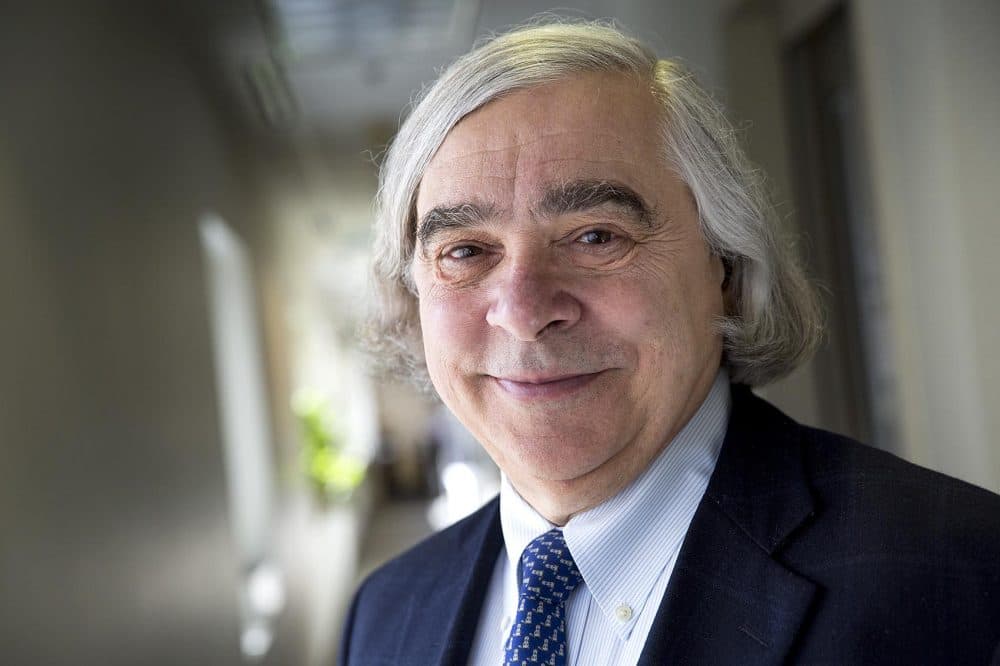Advertisement
Former Energy Secretary Ernest Moniz On Coal, Climate, Innovation And His Successor
Resume
Since he left office in January, former energy Secretary Ernest Moniz has seen significant change in Washington, and more specifically, to the policies he helped initiate.
Last week there was an executive order to dismantle former President Obama’s Clean Power Plan, put into place to reduce carbon emissions. The Trump administration is also reviewing fuel standards and rules governing methane emissions from oil and gas wells.
Moniz joins Here & Now's Robin Young to discuss the Department of Energy and his successor, Rick Perry.
Interview Highlights
On a future without the Clean Power Plan
"The die is cast in terms of heading to a low-carbon future. Meeting the quantitative goals in 2020 or 2025, that will certainly be made more difficult. However, speaking of coal, let's talk about that. I still expect no new coal plants to be built. The reality is, the decrease in coal use, the loss of coal jobs, has been primarily driven by low-cost natural gas. ... An interesting fact is that the number of tons of coal produced per worker in Wyoming, let's say, is nearly 10 times that of West Virginia, because in Wyoming, they have this highly mechanized surface mining. In fact, an irony of the president's actions, is that he also eliminated the moratorium on coal leases on federal lands. If that is exercised, that will further tip the balance towards western coal, which has very, very few jobs associated with it, from eastern coal.
"Long-term, I honestly just don't see that this is going to have an enormous impact. Because carbon dioxide emissions accumulate, if we emit more now, we'll have to cut our budget of emissions even more in the future. So all this is doing is making it harder, and more expensive in the long-term. And the number of jobs lost in, let's say coal, is measured in the couple of tens of thousands. The number of jobs created in the solar industry is about 280,000. The problem is, they're not in the same place. And so the macro economy may actually be better off, but we have local stresses. And so I believe, frankly, that we've not done a good enough job, I think, in working bottom-up to look at what workers need, what communities need, to be helped through a period of transition."
"If we can't even have the facts straight — sometimes, I have to say, it would appear intentionally — it goes I think to the very, very core of our democracy."
Ernest Moniz
On Rick Perry's appointment as energy secretary, and the future of energy innovation
"The statement Perry made, came from, bluntly, he's not the only one who did not have a full understanding about what the Department of Energy does. I will give him credit that in his confirmation hearing, he did not wait for a question, he just addressed the issue head-on and said, 'Look, now that I've been nominated as energy secretary, I've looked at it. I now understand the full range of what this department does to contribute to American needs, and I was wrong.' And certainly in his words, he has, right from the beginning, upon confirmation, emphasized the importance of national laboratories, of R&D, of innovation. ... I know that on his first day on the job, he held a town hall meeting, and I know he certainly said the right things about, again, the innovation agenda, the R&D agenda, the nuclear security agenda.
"Unfortunately, however, especially on the energy innovation front, he made some very positive statements after becoming secretary about the importance, and then, I don't know how else to say it other than being undercut by the [Office of Management and Budget] budget, which in fact zeroed out a program that was in some sense the face of innovation: ARPA-E, Advanced Research Projects Agency-Energy. First 200 projects that were completed by ARPA-E led to 36 companies being formed, it led to well-over $1 billion of private capital coming in. It's all the measures that you would think Democrats and Republicans alike would applaud. [Perry] said it's exactly the kinds of innovators we need to support, and then the Mulvaney announcement on the budget said, with very little detail, it went out of it's way to point out this program would be zeroed out. I do not understand the logic."
On science and facts
"What has to be described as an assault on science, in many, many, many dimensions — climate denial among them — is part of a bigger pattern of what is now often called 'alternative facts,' and I consider this to be one of the most serious developments that we have seen over the last 10 weeks. What could be more essential for the functioning of a democracy than fact-based discussions? Which can lead to very, very different views in terms of how to address the facts. But if we can't even have the facts straight — sometimes, I have to say, it would appear intentionally — it goes I think to the very, very core of our democracy. And I think we have a lot of introspection and dialogue and action that we need to take in civil society to restore fact-based discussions."
This article was originally published on April 03, 2017.
This segment aired on April 3, 2017.